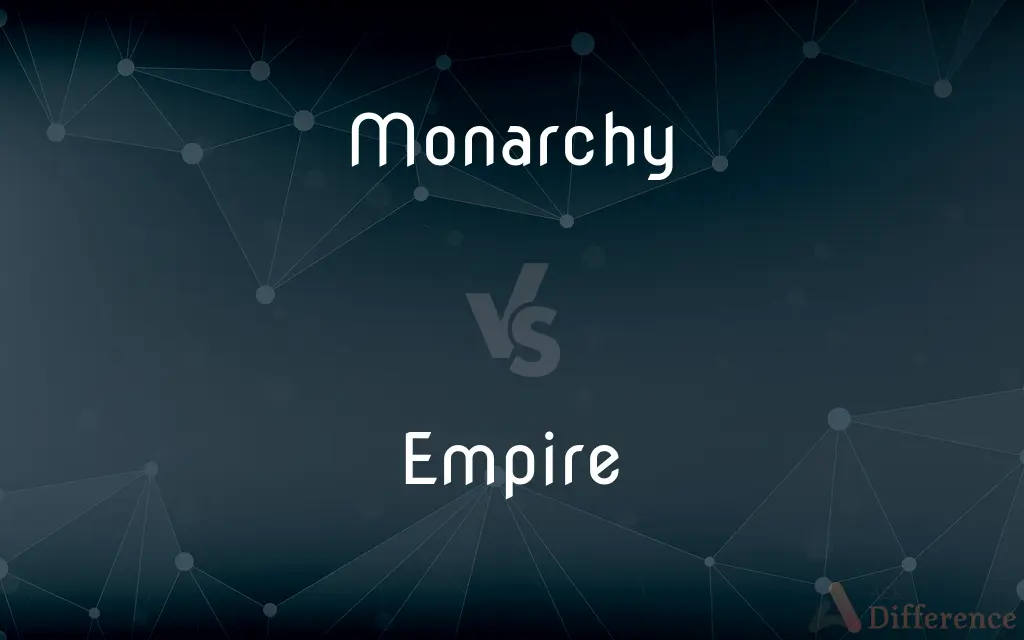Monarchy vs. Empire — What's the Difference?
By Tayyaba Rehman & Fiza Rafique — Updated on February 28, 2024
Monarchy is a form of governance led by a single individual, such as a king or queen, while an empire typically refers to a vast sovereign state under a single supreme authority, often an emperor, encompassing various territories and peoples.

Difference Between Monarchy and Empire
Table of Contents
ADVERTISEMENT
Key Differences
Monarchy focuses on the rule by a single family lineage, where leadership is passed down hereditarily. An empire, on the other hand, may be ruled by a monarchy but is defined by its expansive control over diverse territories and peoples.
A monarchy often governs a single nation or territory, an empire extends its rule over multiple nations or territories, showcasing its vastness and diversity in governance and culture.
The monarch's role is typically symbolic or constitutional in modern contexts, while emphasizing tradition and unity. Conversely, an emperor or empress might wield substantial power, directing the empire's expansion and administration.
Monarchies can exist within empires as constituent parts, indicating that an empire can encompass monarchic governance structures within its broader dominion.
Empires are characterized by their emphasis on expansion and consolidation of power across territories, contrasting with the more stable and territorially consistent nature of monarchies.
ADVERTISEMENT
Comparison Chart
Definition
Governance by a single family, usually hereditary.
Sovereign state comprised of multiple territories/nations under one ruler.
Scope
Typically limited to one nation or territory.
Extensive, covering multiple nations or territories.
Leadership
Monarch (king, queen)
Emperor/empress
Power Concentration
Often symbolic or constitutional in contemporary settings.
Potentially absolute, with emphasis on expansion.
Structure
Singular governance system
Can include various governance systems, including monarchies.
Compare with Definitions
Monarchy
A system of government where a state is ruled by a single family through hereditary succession.
The United Kingdom is governed by a constitutional monarchy.
Empire
A vast sovereign state ruled by an emperor or empress, often comprising multiple territories and peoples.
The Roman Empire was one of the most powerful empires in ancient history.
Monarchy
Characterized by the ceremonial roles of monarchs in modern contexts.
In Japan, the emperor performs important cultural and religious duties.
Empire
Known for military conquest and cultural integration of conquered territories.
The British Empire spread its influence globally, colonizing various countries.
Monarchy
Often involves a life-long tenure of the monarch until abdication or death.
Queen Elizabeth II served as the monarch of the United Kingdom for over 70 years.
Empire
Empires often rise and fall through the ages, leaving significant cultural legacies.
The fall of the Ottoman Empire marked the end of a significant era in Middle Eastern history.
Monarchy
Symbolizes national unity and continuity.
The Swedish monarchy is seen as a unifying symbol of the country's history and culture.
Empire
Characterized by complex administrative structures to manage diverse regions.
The Mughal Empire had a sophisticated bureaucracy that managed its vast territories.
Monarchy
Can be absolute or constitutional, depending on the monarch's powers.
Saudi Arabia is an example of an absolute monarchy.
Empire
Symbol of power and expansion, often associated with a specific period of history.
The Mongol Empire is known for its rapid expansion across Asia and Europe.
Monarchy
A monarchy is a form of government in which a person, the monarch, is head of state for life or until abdication. The political legitimacy and authority of the monarch may vary from restricted and largely symbolic (constitutional monarchy), to fully autocratic (absolute monarchy), and can expand across the domains of the executive, legislative, and judicial.
Empire
An empire is a sovereign state made up of several territories and peoples subject to a single ruling authority, often an emperor. A state can become an empire either by a narrow definition through having an emperor and being named as such, or by a broad definition as stated above as an aggregate territory under the rule of supreme authorities such as the Roman Empire.
Monarchy
Government by a monarch.
Empire
An extensive group of states or countries ruled over by a single monarch, an oligarchy, or a sovereign state
The Roman Empire
Monarchy
A state ruled or headed by a monarch.
Empire
A political unit having an extensive territory or comprising a number of territories or nations and ruled by a single supreme authority.
Monarchy
The territory ruled over by a monarch; a kingdom.
Empire
An extensive enterprise under a unified authority:a publishing empire.
Monarchy
A form of government where sovereignty is embodied by a single ruler in a state and his high aristocracy representing their separate divided lands within the state and their low aristocracy representing their separate divided fiefs.
Empire
The group of states or other territories that owe allegiance to an imperial power (foreign to them), when distinguished from the native territory of that power; imperial possessions.
Monarchy
A state or government in which the supreme power is lodged in the hands of a monarch.
Empire
Any dominion; supreme control; governing influence; rule; sway; as, the empire of mind or of reason.
Another force which, in the Middle Ages, shared with chivalry the empire over the minds of men.
Monarchy
An autocracy governed by a monarch who usually inherits the authority
Empire
The domain ruled by an emperor or empress
Empire
A monarchy with an emperor as head of state
Common Curiosities
What defines an empire?
An empire is a vast sovereign state under the rule of an emperor or empress, comprising multiple territories or nations.
How does a monarchy differ from an empire in terms of territory?
A monarchy typically governs a single nation or territory, while an empire spans multiple nations or territories.
Can a monarchy be part of an empire?
Yes, monarchies can exist within empires as constituent parts, with the empire encompassing a broader dominion.
What is a monarchy?
A monarchy is a form of government where a country is ruled by a single person, usually a king or queen, based on a system of hereditary succession.
What is the role of a monarch in a modern monarchy?
In modern monarchies, the monarch often has a symbolic or constitutional role, focusing on tradition and national unity.
What is a constitutional monarchy?
A constitutional monarchy is a form of monarchy where the monarch's powers are limited by a constitution, often sharing power with a parliamentary system.
Can an empire be democratic?
While empires historically have been associated with centralized power, it's theoretically possible for an empire to have democratic elements within its governance structure.
What happens to a monarchy when the monarch dies?
Leadership typically passes to the next in line for the throne, often determined by hereditary succession or other pre-established guidelines.
Are all empires ruled by emperors?
While the term "empire" suggests rule by an emperor or empress, some empires have been led by kings, queens, or other titles, emphasizing their expansive control over territories.
How do empires maintain control over diverse territories?
Empires maintain control through military presence, administrative structures, and sometimes by promoting economic and cultural integration.
How does an empire expand its territories?
Empires expand through military conquest, diplomacy, and sometimes through cultural assimilation of other nations.
What is the difference in leadership between a monarchy and an empire?
A monarchy is led by a monarch (king or queen), while an empire is led by an emperor or empress.
What is the significance of empires in history?
Empires have played significant roles in shaping the world's political, cultural, and social landscapes through their conquests and governance models.
How is power transferred in an empire?
Power transfer in an empire can vary, often involving succession laws for monarchies within the empire or the emperor's decrees.
What role do monarchs play in contemporary societies?
In contemporary societies, monarchs often serve symbolic roles, embodying national traditions and unity, with limited political power.
Share Your Discovery

Previous Comparison
Veranda vs. Balcony
Next Comparison
Rub vs. ScrubAuthor Spotlight
Written by
Tayyaba RehmanTayyaba Rehman is a distinguished writer, currently serving as a primary contributor to askdifference.com. As a researcher in semantics and etymology, Tayyaba's passion for the complexity of languages and their distinctions has found a perfect home on the platform. Tayyaba delves into the intricacies of language, distinguishing between commonly confused words and phrases, thereby providing clarity for readers worldwide.
Co-written by
Fiza RafiqueFiza Rafique is a skilled content writer at AskDifference.com, where she meticulously refines and enhances written pieces. Drawing from her vast editorial expertise, Fiza ensures clarity, accuracy, and precision in every article. Passionate about language, she continually seeks to elevate the quality of content for readers worldwide.















































